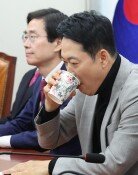Rival parties waging `war of nerves` over 2013 budget
Rival parties waging `war of nerves` over 2013 budget
Posted November. 05, 2012 04:13,
The ruling Saenuri Party and the main opposition Democratic United Party are locking horns over the budget plan for next year that the government proposed to the National Assembly.
Both sides are striving to reflect the pledges of their respective presidential candidates, but a compromise seems difficult to reach because of the large budget gap between ruling party contender Park Geun-hye and her opposition rival Moon Jae-in.
In addition, the government has opposed the candidates` requests for an increased welfare budget, claiming that welfare programs are hard to remove once they are started. Without a King Solomons solution, the budget bill is unlikely to pass parliament before the deadline agreed by both parties or Nov. 22.
○ Both sides want their pledges reflected in budget
Both the ruling and opposition parties say the governments planned budget of 342.5 trillion won (313.7 billion U.S. dollars) is not enough to overcome the economic downturn. They have a different take, however, on the amount of each budget item.
Both sides have just a few items in common among the top 10 priorities that they announced recently: childcare subsidies for children up to age 2 for all income levels; subsidies for the same purpose for children up to age 5 irrespective of income level; and keeping college tuition down and providing lower interest rates on student loans.
The ruling party claims that the budget should include the following: a "hope ladder" scholarship for students on the condition of working at a small or medium-size company after graduation; raising the average salary for a soldier; raising social welfare benefits for low-income households; and subsidies for heating and grain for centers for the elderly. These proposals are what Park Geun-hye, the ruling party`s presidential candidate, said while campaigning in the April 11 general elections. These pledges thus laid the groundwork for her promises made for her presidential campaign. Saenuri plans to raise the budget 1.6 trillion won (1.4 billion dollars) after negotiations on the budget proposal.
The Democratic United Party, however, wants to raise the budget 5 trillion won (4.58 billion dollars) to fund state-sponsored employment projects as well as focus on eco-friendly free school lunches, increase the basic retirement pension, and starting more joint projects with North Korea. Most of the pledges are identical with those of the party`s presidential candidate Moon.
If all of the main opposition party`s projects are reflected in the budget, the amount will reach 12 trillion won (10.99 billion dollars). The party claims that the government can raise 9 trillion won (8.25 billion dollars) by scrapping ventures that are not urgent or less efficient and an additional 3 trillion won (2.75 billion dollars) by repealing tax cuts for the rich.
Both parties cannot easily take a step back because projects that require more funds are among their candidates pledges. The ruling party, which has the upper hand in getting its budget proposal passed, should also implement its budget plan given that its candidate Park has the image of a politician "who keeps her promise.
○ Tug of war with government
Another challenge to the budget proposals is persuading the government. Article 57 of the Constitution stipulates that the National Assembly cannot increase the budget without government consent.
The Strategy and Finance Ministry opposes the budget increase, saying, It is inappropriate to increase welfare programs indiscriminately. Finance Minister Bahk Jae-wan also said on the first day of a Q&A session of the National Assembly`s Special Committee on Budget and Accounts Wednesday, The welfare budget should be reflected permanently once created.
To the main opposition party, which says extra budget should come from canceling tax cuts for the rich, the minister said, The top 1 percent of the income bracket pays 46 percent of income taxes, which is relatively heavy compared to developed countries. The broad revenue source and platform of low tax rates should remain intact.
Considering the presidential election schedule, both the ruling and opposition parties plan to have their budget proposals reviewed by the ministry and then send them to the subcommittee for preliminary budget adjustment next week. Then they hope to pass the budget bill in the general parliamentary session Nov. 22. Should they fail to reach an agreement, however, the proposal will likely to be postponed until after the Dec. 19 election.
peacechaos@donga.com gaea@donga.com







